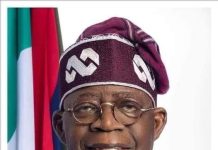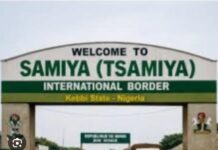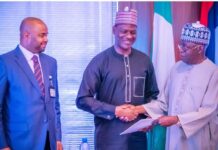
Missing Link: Rejoinder To Niran Adedokun, By Muiz Banire
At the time of my piece on Alternative Contact Address, little did I realise that Nigerians were yearning for a reawakening, nay, revival, of moral standards of the past commonly taken for granted in other climes where values still matter. Notwithstanding the warm reception of the message, I resolved not to make any further comment on the issue.
I was preparing another public service paper on open defecation in our environment as my last column for the year. However, on Thursday, December 19, I stumbled on a write-up on the same issue of importance of alternative contact address in the Punch newspaper written by Niran Adedokun whose writings I have come to treasure. His article, titled, “Banire and Importance of an Alternative Address,” did not disappoint. It, however, prompted me to explore the matter further, particularly in light of what I consider to be the lacuna in our analysis of the subject.
Let me state that the lacuna in this context means a further area of discussion towards resolving our collective identifiable challenge and achieving the desired goal of the subject.
Before delving further into the issue, let me specially commend Mr. Adedokun for introducing another perspective to the issue. While my opinion in the Alternative Address piece was not set out to account for the factors responsible for the indiscretion or ‘misbehaviour’ of our people, Mr. Adedokun’s article was essentially on the causal factor of mass indiscretion.
What I intend to do in this article is to interrogate the way forward and, hopefully, provide the missing link. I hope there will be more Adedokuns to interrogate this aspect more towards a collective resolution of the challenge of why people worship public office and hang their hopes on public officers’ readiness to dispense official largesse in a Father Christmas opulence.
This becomes important against the background of the President’s speech that he will ensure a free and fair election during the transition in 2023. For the benefit of those that missed the two series, my initial article on the attitude of Nigerians to public office https://www.sunnewsonline.com/my-disengagement-and-importance-of-alternative-address/, which attitude is less befitting, and that of Mr. Adedokun, which accounts for the trigger of the indiscretion, largely, according to him, stemming from poverty (See https://punchng.com/banire-and-importance-of-an-alternative-address/).
Let me state unequivocally that I concur in toto with the diagnosis of Mr. Adedokun, which, for years now, has been my position. The little that he did not get to is the fact that, in my view, it would appear that the abject poverty the people are consigned to is a deliberate policy of the political class.
It is in this connection that I remember the analysis of Francis Fukuyama in his book, The Origin of Political Order, in the preface to which he analysed the traditional Melanesian wantok politics in Papua New Guinea and the Solomon Islands. Melanesian society is organised based on tribal arrangements of what anthropologists refer to as “segmentary lineages.” Each segment speaks a peculiar language different from the next and the tribes are referred to as wantok: a corruption of the English expression “one talk,” that is, people who speak the same language, and the resultant effect is that “Papua New Guinea hosts more than 900 mutually incomprehensible languages, nearly one-sixth of all of the world’s extant tongues.”
The same thing applies in Solomon Islands with a population of just about 500,000 who speak more than 70 different languages (See Francis Fukuyama). Each wantok is led by a Big Man. What makes a Big Man is not hereditary but rather the ability to distribute food, money, pigs and other resources to the poor members of the traditional Melanesian society. Despite independence to Papua New Guinea and the Solomon Islands in the 1970s and the importation of modern western style of government dominated by multi-party democracy, the wantok understanding of leadership emergence has not left the traditional wantok consciousness as, according to Fukuyama, “…most voters in Melanesia do not vote for political programmes, rather, they support their Big Man and their wantok. If the Big Man (and an occasional Big Woman) can get elected to parliament, the new MP will use his or her influence to direct government resources back to the wantok, to help supporters with things like school fees, burial costs, and construction project. Despite the existence of a national government with all of the trappings of sovereignty, like a flag and an army, few residents of Melanesia have a sense of belonging to a larger nation, or being part of a social world much beyond their wantok.”
The interpretation of the above is evidently a poverty-stricken society, which is the lot of most mountainous areas like many parts of Papua New Guinea. Thus, every Big Man looks over his shoulders to avoid being displaced by another Big Man and his ability to distribute welfare package of what is ignominiously known as “stomach infrastructure” in Nigeria, which makes him relevant.
For a people to be subjugated to the inhuman treatment of surviving on their stomachs and their basic responsibilities of paying hospital bills, school fees, feeding, etc, to be transferred onto a politician is a product of a zenithal degree of poverty. The people must, therefore, remain poor for the Big Man to be relevant in politics.
The above scenario applies in Nigeria as if we were in a wantok circumstance with albeit a little bit fewer number of languages and a bigger population as the purported 200 million Nigerians speak not fewer than 350 languages. We are probably just made of bigger wantoks as we share other common political features of the Melanesians. Many voters in Nigeria, like in the Melanesian society, do not vote for ideas or political programmes but rather the hunger-induced sentiment of ‘he is rich and can provide the immediate needs.’ Little wonder, therefore, that there is hardly any political party in Nigeria with a clear-cut political ideology that members genuinely adore. https://www.sunnewsonline.com/nigeria-how-did-we-get-here-3/.
Poverty, therefore, becomes a potent weapon by which godfathers and comprador bourgeois elements keep the reins of the people in their hands, the essence of which is to ensure the inability of the masses to reason, much less react to or entertain any critical thought. As I have said in several papers and public lectures in the past, the resultant effect of the inflicted poverty on the people is ignorance, as a hungry soul is not a rational being. This ignorant mass constitutes not only a sizeable proportion of the entire population but forms the absolute majority of those who vote at elections. They are the people that determine our collective destiny out of wanton ignorance and complacency. These are voters without any knowledge of why they are voting, much less knowing the character of the person for whom they are voting. The bad news is that even the few enlightened ones that remain hardly vote for one porous reason or the other. The consequence of the foregoing is the election of bad products in the name of leaders.
What then do we put in place to correct this fundamental flaw? The solution lies in the education and enlightenment of this lot who interrogate no ideas or promote any noble ideals. You can read more on the atrocities these group of people innocently commit on the nation in my writeup, “Nigeria: How did we get here? (3),” in my column in the Daily Sun of September 19, 2019. Who owes this duty of civic education of the masses?
Ordinarily, INEC has statutorily assumed this role, which has been played poorly. The National Orientation Agency under my brother, Dr. Garba Abari, has not fared well.
Honestly, it would be targeting the wrong direction to expect any magic from the government in this regard. Apart from the limitation of the government, we have submitted earlier that it will not be in the interest of the political class to liberate the political pawns by which they sustain themselves in power. Do you expect the National Assembly to vote any huge amount of money to accomplish this ideal when a promotion of noble democratic objectives would evict most of the members from the offices they occupy – a National Assembly whose renovation budget is allegedly equal to or greater than the budget for education? It would also amount to playing clowns, if we expect elected members of the executive branch to support the idea.
Our elected representatives represent the aggregate of our own wantok Big Men who assume office and return only to pay school fees of a few indigent students, sponsor the burial ceremonies of a few members’ deceased relatives, buy JAMB forms for a few university admission seekers and launch the construction of a borehole for a community deprived of pipe borne water by the same system that is now playing benevolence to their unwary lot.
Therefore, I believe we must quickly dispense with any expectation of liberation from the elected officials (rulers) and focus on our collective and individual efforts as Nigerians.
This brings to fore the role of the elite in the enthronement of good governance in Nigeria. The elite, in this context, are not restricted to graduates of formal institutions alone but all who know the right thing to do. Ordinarily, I would have zeroed in on the middle class but when I realised that they are no more in existence I quickly shifted forward. The educated elite owe the system a huge responsibility of enlightening the populous illiterates that are the architects of our woes as a nation due to their innocent acts, resulting from ignorance.
My expectation all the while is that the educated elite would be playing a significant role in the education of the largely populated ignorant lot. This never happened because these privileged members of society feel so comfortable with the system to the extent of maintaining an it-doesn’t-concern-me attitude.
This has deepened the proliferation of ignorance all over. The good news, however, is that the elite are now equally hit by the net effect of the action of the majority ignorant voters. Sizeable numbers of them have not only lost their businesses, they are endangered by the poverty around them. They cannot jog round their various estates anymore with substantial assurance of safety. They are not at peace when their children go out for fear of being attacked. We have only succeeded in creating prison walls around our homes and turning our innocent children to prisoners without any correctional purpose. We try to seclude them from the palpable dangers lurking around in the hands of the violent brutes the society has made of the children of the poor. Some elite have relocated consequently; some have withdrawn into their shells, while a great percentage is groaning, grumbling and complaining all about.
Let me inform you that the analgesic to your multiple aches lies in the education and enlightenment of the majority ignorant voters. In addition, they deserve our protection in the hands of their oppressors. I often illustrate this with the peculiar and pathetic case of marketwomen and men. These struggling people who hitherto lacked any form of care from government at all levels prior to the election period are often compelled, under the threats of closure of their markets or physical assault by thugs of the political godfathers, to sleep in the market in the open air, not just to ensure exercise of their franchise there but to vote compulsorily in favour of the ruling party in the area.
For enticement, at the best, they are offered a few cups of rice and a cow to be killed and shared in the market, often insufficient to go round. For these, most times, they must sleep in the market. By the next morning, some wake up in feverish conditions, while others develop pneumonia without any assistance from their oppressors towards treatment of these ailments. Eventually, some die off. Apart from being unable to exercise their franchise freely, they are subjected to these inhuman, degrading and tortuous treatments without any protection from any quarters.
In the circumstances, they become mere obedient servants in the hands of the political class. The moment the election is over, they are thrashed and discarded, with calamitous damage to the interest of the nation and our collective interest.
Where is the media generally in all these? I am yet to witness any consistent, regular and all-round-the-season organisation of communal talks, workshops or seminars by any of the media houses in the education of the people in the exercise of their franchise. It is only when the elections are around the corner that you see a smattering of efforts in the guise of mass electoral education, often too late to achieve anything tangible.
This must be a project that the press must prioritize round an electoral cycle. It is not after the emergence of these electoral misfits that we start quarrelling and criticising the elected juveniles who see themselves as the purchasers of our collective conscience and can afford to pulverize same without compunction or remorse.
Again, where are the various non-governmental organizations and the civil society groups? Are they busy chasing ‘human rice’ instead of this fundamental human right that is the mother of all others? It is only when you truly have a government of the people that you sweat less in protecting or enforcing the fundamental human rights of others. Our focus must be at the entry point. The ignorant voters need to be shown the essence of their franchise and the consequence of exercising it wrongly. They need to know the pedigree and competence of those candidates before them to choose from. They must be told in no unmistakable terms that parochial considerations such as my faith member, ethnic or tribal brotherhood must be eschewed. They must jettison the idea of considering their votes as merchandise in a mercantilist mentality where mundane gains of immediate essence dictate exchange of commercial articles.
I challenge each and every enlightened mind to move out from now to start the crusade. Not until we are able to open the eyes and minds of these people will they cease unleashing danger on us through the election of wrong people into office. This is the missing link we need to fill urgently and in concrete terms.





